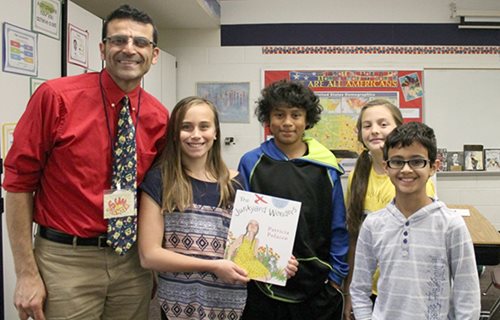November 17, 2015
One of the most amazing and pleasurable things I get to do as an educator is read aloud to my students every day. As the Michigan Teacher of the Year, I have made it a priority to read aloud to students in classrooms across the state. One of the three components of my MTOY platform is literacy, and educators and parents know the central role that reading aloud plays in the literacy lives of both children and adults.
As humans, our brains are hard-wired for stories. We tune in naturally to the familiar architecture of a story arc, with its problems, solutions, characters and setting. Joseph Campbell writes about the
Hero’s Journey as a global story archetype, one that is common to all cultures around the globe. Our stories have always helped us not only communicate, but make sense of our world and realize our place in it. Reading aloud creates community through the sharing of stories. We recognize ourselves in listening to the experiences of characters in stories, and reading stories informs our ability to live meaningful lives.
A few months ago, after soliciting ideas on social media, I selected
“The Junkyard Wonders” by Michigan author/illustrator Patricia Polacco as the Official Book of the Michigan Teacher of the Year 2016. The story compels readers to realize that no matter their ability, they are geniuses. According to Buckminster Fuller, all children are born geniuses. It is only when students attend school that they become “de-geniused.” The message of “The Junkyard Wonders” is that we ought to seek out our genius, nurture it through hard work and use our genius to contribute to the betterment of others and the world. We all belong and we all have something to contribute to our communities. This is a message that everyone needs to hear, constantly. No group needs to hear this idea more than our children.
People have known and understood for years that story may not only entertain and soothe kids, it may also develop their vocabulary, improve their ability to learn to read and – perhaps most important – foster a lifelong love of books and reading.
The ability to develop a passionate reading life is crucial, according to Jim Trelease, author of the best-seller “
The Read-Aloud Handbook.” “Every time we read to a child, we’re sending a ‘pleasure’ message to the child’s brain,” he writes. “You could even call it a commercial, conditioning the child to associate books and print with pleasure.”
This reading “commercial” is critical when competition for a child’s attention is so fierce. Between television, movies, the Internet, video games and myriad after-school activities, the pleasures of sitting down with a book are often overlooked. In addition, negative experiences with reading – whether frustrations in learning to read or tedious “drill and kill” school assignments – can further turn children off from reading.
A child who does not have a healthy reading habit may suffer long-term consequences. As Trelease succinctly puts it in his handbook, “Students who read the most, read the best, achieve the most and stay in school the longest. Conversely, those who don’t read much, cannot get better at it.” It’s a relatively simple idea, and comes down to the importance of building a habit. Additionally, reading aloud is, according to the landmark 1985 report
Becoming a Nation of Readers, “the single most important activity for building the knowledge required for eventual success in reading.”
Recently, I read “The Junkyard Wonders” aloud to fifth graders at Deerfield and Auburn Elementary Schools in the Avondale Public School district. The kids were enthralled with the story and connected easily with Polacco’s message of optimism, hope and perseverance against all odds. What was most remarkable about my visit to Auburn is that I returned there the next day for an unrelated meeting. I stopped in the same fifth grade classroom where I had visited the day before. The students happened to be independently reading when I arrived. As soon as I entered the classroom, I was swarmed with kids who were thrusting their books in my face.
“Mr. Joe, have you read ‘
The Crossover’?” came an inquiry from an eager fifth grade boy.
“I’m reading ‘
El Deafo,’ have you read this book?” asked another.
“Look what I’m reading, ‘
Wonder.’ I love this book. Have you read it?”
I was flabbergasted that a read-aloud from the day before, to complete strangers, had created this instant reader-to-reader bond. I was reminded of the intense power that reading aloud has to stimulate a desire in the listener to grab a book and read more. I felt part of a community of readers who talk about the stories they’ve read, try to make sense of them and connect them to their own lives. Kids were so hungry to share their books with me, to communicate their excitement about stories and to urge me to read, read, READ!

Auburn Elementary (top) and Deerfield Elementary students gather after read-alouds of “The Junkyard Wonders.”
 Rick Joseph is Michigan’s Teacher of the Year for 2015-16. He’s a fifth/sixth grade teacher at Birmingham Covington School and has more than 20 years of classroom experience. He is also a first-place award winner at the 2012 Microsoft Global Forum for Expert Educators, which was held in Prague.
Rick Joseph is Michigan’s Teacher of the Year for 2015-16. He’s a fifth/sixth grade teacher at Birmingham Covington School and has more than 20 years of classroom experience. He is also a first-place award winner at the 2012 Microsoft Global Forum for Expert Educators, which was held in Prague.